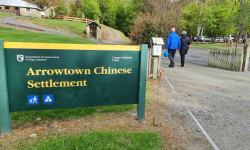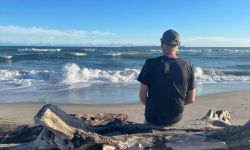
During World War II, the New Zealand Government appropriated land in Te Kōpua, Raglan, to build an aerodrome. When no longer required for military purposes, a large block was later converted into a public golf course.1 Jordyn Rapana writes about her tupuna wahine Tuaiwa (Eva) Rickard, whose Christian faith informed her 1970s fight to have the land returned to its Māori owners.
Can you hear the voices? Chaotic and contrasting. Busy. Aggressive. In total juxtaposition with the blissful February summer sun shining over a glistening green golf course. And there, by the ninth hole, you can see her. She, alongside many others, occupies the whenua like she ‘knows’ there, because she has grown there. Her story is indented in the grooves that line her countenance, her brows furrowed in deep-seated fervour for justice. A worthy fight.
Her heart beating in time with the whenua, she plants her feet to claim back a birthright, an earth right. A perplexing paradox, she charges us forward by standing completely still. There on the lush golf course—a perfect fantasy of everything it was never meant to be—she remains, disrupting the daydream, seemingly with very few but, in actuality, with the bones of her predecessors and generations of whakapapa. A prophetic anticipation of where her own bones would eventually find rest.
And in a bewildering moment, in the midst of the familiar jingles of protest, she, a justice warrior, comes into contact with the recognised faces of ‘justice’ keepers. The juncture that bleeds beyond the confinements of a 40-year-old picture: the defining moment, televised nationally, of her arrest. Eva Rickard is dragged from the premises, hands in cuffs, on an account of trespassing.
Activism
It’s almost humorous: arrested for trespassing on the land that rightfully belongs to her hapū. Rickard’s radical activism takes place on the land that she is most familiar with. Her fight is reflective of the defining feature of Tainui Āwhiro hapū (sub‑tribe), described as “ngunguru te pō, ngunguru te āo”, which talks of the ongoing rumbling, the unsettledness through the night and the day.
Rickard emerges from this context of longing and groaning and restlessness. Her passion is reflective of the unrelenting waves of the moana (sea), Whāingaroa: a consistent strength and force of movement. Her steadfastness is reflective of the maunga (mountain), Karioi, said to resemble a woman sleeping peacefully on her side. Rickard found peace in the presence of a government that wanted to steal from her, and the church that would not stand with her.
Faith
Saved at a Billy Graham crusade, Rickard came to hear the gospel of Jesus Christ that was genuine, powerful and transformative good news to her. She encountered a people-loving, justice-yearning Jesus, and gave her entire life to what she believed to be God’s mission for our nation. It was about being courageous in the overwhelming culture of dominance. It was about restoring and enhancing the mana of her people. This helped her to wrestle her way through her faith and Scripture that spoke of a justice for the oppressed that she was not witnessing in the faith communities surrounding her.
She could not shake the conviction that (in her own words), “If Christ came to Raglan he would see two classes of people—the rich and the powerful in the town and the disinherited Māori. He knows what it is to suffer, to be despised and rejected and pushed aside by the powerful and the rich. This is the side where I believe Jesus would stand—with those of us who are struggling to build community strength among a dispersed, disadvantaged people.”2
Her journey was fraught with an absolute onslaught of opposition, not only from governmental powers but from her own community. They wanted so badly to shut her mouth. She was this Māori woman with a revelation of a truly bicultural relationship and who was taking responsibility to hold our Treaty partners accountable, at every cost. It cost her an entire lifetime, for the sake of the gospel, for the sake of the great-great-great-grandchildren she would never meet, for the sake of women and for the sake of the bicultural journey. It caused discomfort for those in power who did not want to be held accountable for their dishonesty.
Mandate
Forty years on from her iconic arrest, we have God’s grace in the form of hindsight. I realise that Rickard was just living out the mandate that God had given all throughout his Word: his call for justice; his call to those who are marginalised; and his honour and integrity in covenantal relationship despite everything it cost him—how he endured rejection and oppression from those in power and by his own people for the joy set before him.
Rickard served her days as a responsible Treaty partner. She provided strong leadership and resourced Māori leadership. She had the confronting conversations when needed and did not let fear dictate the lengths she would go to, to ensure justice. It is a journey that comes at a cost of comfort and power.
Rickard’s story serves as a legacy to us, her whānau in Christ. We have amazing opportunities every day to uphold that legacy—unlearning and re-learning, and taking our partnership responsibilities seriously. At the core of all the affirmations of Rickard’s leadership, she—a mum, a wife, a volunteer at the local Plunket, an elder at a local church—was simply one who heard God’s calling and ran with it into eternity.
How much more, then, could we participate in God’s mission for our local contexts and our nation? How much more could we operate as Treaty partners? This fundamental and covenantal relationship is God’s gift to our nation that comes with responsibilities for both parties, to become strong hosts to every other nation that finds a place of belonging in Aotearoa.
Story: Jordyn Rapana
Jordyn is a recent graduate of Carey Baptist College, graduating with a Bachelor of Applied Theology. Based in Pukekohe, she serves in the area of worship in her local context of Franklin Baptist Church, as well as the wider denomination. Her love for stories and storytelling influences her keen learning, and then sharing, of the stories that live in our own land, histories and families.
References:
- “Eva Rickard,” Wikipedia. en.wikipedia.org/wiki/Eva_Rickard.
- “IV Responding to our own context,” Christian World Service. cws.org.nz/About-Us/ethos-4.asp.
To mark Suffrage Day 2018, 25 influential women were added to the Dictionary of New Zealand Biography. Tuaiwa Rickard was one of these. Read her biography.


